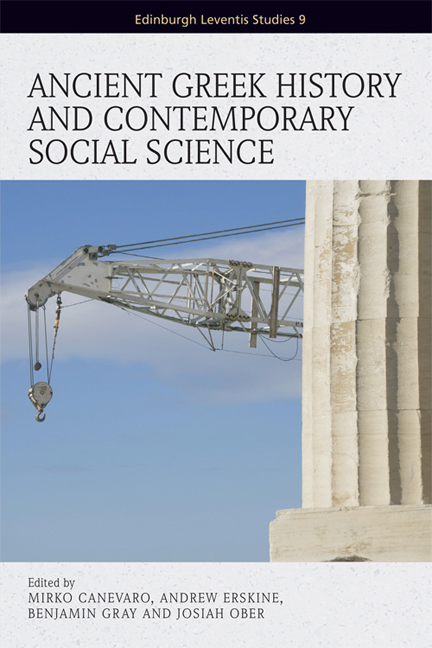4 - Majority Rule vs. Consensus: The Practice of Democratic Deliberation in the Greek Poleis
Published online by Cambridge University Press: 06 May 2021
Summary
Finora ci siamo divisi, urtati, lacerati nella stessa discussione del testo costituzionale. Ma vi era uno sforzo per raggiungere l’accordo e l’unità. E ora io sono sicuro che nell’approvazione finale il consenso sarà comune ed unanime e dirò che, al di sotto di una superfice di contrasto, vi è una sola anima italiana. L’Italia avrà una Carta costituzionale che sarà sacra per tutti gli italiani.
22 December 1947Meuccio Ruini, Assemblea CostituenteINTRODUCTION
I take as my starting point for this chapter three remarkable recent books, all published in 2013. These volumes should make those of us that study Greek democracy very pleased with the ‘relevance’ of the object of our research and our passion – at least if we espouse Ober and Hedrick's project ‘of applying insights gained from political and social theory to problems of Greek history, and in turn using the Greek historical experience of democracy as a resource for building normative political theory’.
The first of these books is Counting the Many: The Origins and Limits of Supermajority Rule, by Melissa Schwartzberg (a political scientist). This monograph presents a strong and original argument against all forms of modification to simple majority rule, understood as the use of the majority principle in political decision-making. It questions in particular supermajority rules, which have become increasingly widespread in modern constitutional democracies as instruments to protect the rights of minorities against the tyranny of the majority. She argues that simple majority is the only voting system, and the only system of decision-making, that fulfils the requirements of the principle of equal respect – all modifications to majority decision-making towards supermajority automatically give some votes (and therefore some voters) more weight than others, undermining the equality on which democracy should be founded. In her own words, ‘the individual, counted vote – weighed equally through majority rule – recognizes the dignity of citizens as judges of political matters’. Schwartzberg's argument develops in new directions the key contention of Jeremy Waldron's Law and Disagreement, and of several other works of his: that checks over simple majority rule are incompatible with democracy.
- Type
- Chapter
- Information
- Ancient Greek History and Contemporary Social Science , pp. 101 - 156Publisher: Edinburgh University PressPrint publication year: 2018



